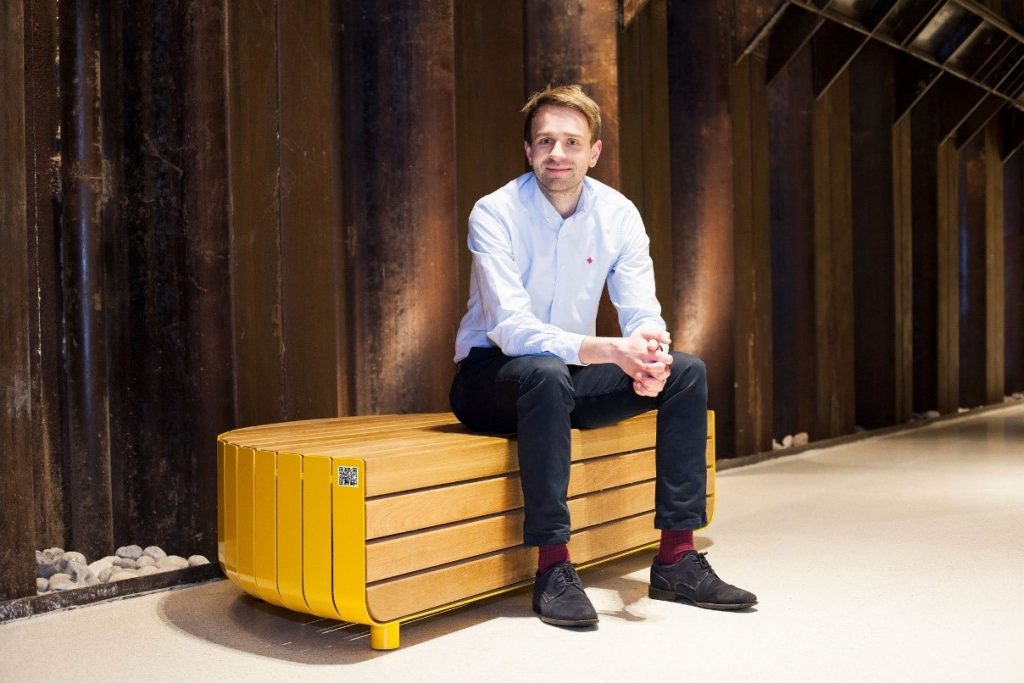Blockchain technology for greener material
The focus on more sustainbale product standards and operations has increased dramatically in the recent years. With the vast amount of information and various standards, providing accesss to quality facts that can enable the customers to review products from start to finish is more important than ever. By doing so, the customer can make greener purchase decisions based on facts not just claims. Hydro and DNV GL are initiating a blockchain pilot to document product representations for Hydro CIRCAL and Hydro REDUXA.

Illustration shows Jan Christian Vestre with one of his company’s benches carrying a QR code for blockchain tracing. (Credit: Charlotte Sverdrup)
More about blockchain tracing and sustainability in Hydro, in the podcast Hydro Talks.
Click here to listen
“We see that our customers and their customers request trusted information documenting the footprint from our materials and production. The aim of the pilot is to test a platform that supports manufacturers and brands to back their sustainability claims with verified data. This will allow them to trace the metal from the factory gates until it reaches the customer,” says Bjørn Kjetil Mauritzen, Head of Sustainability in Hydro.
Tag. Trace. Trust
Hydro will implement the blockchain-powered “Tag. Trace. Trust.” service developed by DNV GL. It allows anyone to instantly check the validity, data and authenticity of the product’s environmental profile. “In this way, the aluminum product passport, with its unique digital ID, attached to the product displays key sustainability facts, such as low-carbon aluminum and post-consumer scrap content,” explains Lin Jacobsen Hammer, Business Development & Sustainability Manager in DNV GL-Business Assurance.
From raw material to a park bench
In the pilot phase, Hydro and DNV GL will work with the sustainable-furniture maker Vestre. The company uses Hydro CIRCAL in selected furniture lines. The product data on the platform gives the company and their customers traceability of the aluminium and the CO2 emissions from raw material to a finished bench in a public park.
The next step is to review the experience from the pilot to assess how Hydro can implement the platform to a standardized model. The goal is to roll out the platform to Hydro customers in 2021.
“Ultimately, this pilot is made possible through the work we have invested in our greener brands in recent years. As a result, we can now explore how new technology can provide the market and the conscious consumer with key data – presented in a way they understand and trust – as a part of our agenda of driving sustainability,” says Jørgen Hansson, project lead in Hydro.
What is blockchain?
Blockchain is a technology that allows for data to be validated and subsequently stored as an immutable ‘block’ through a peer-to-peer community on a digital database building on the principles of distributed ledger technology. The resulting blockchain is immutable because every block is validated based on previous blocks, making it near to impossible to alter – as the modification of a recorded transaction would require modifying all previous blocks. Blocks are validated by an algorithm to ensure replication among nodes is undertaken. Third-party verification of processes on integrity of adding data as well as data checks add confidence that product claims are trustworthy and documented.
How could a blockchain-enabled system provide provenance and responsible production claims?
A producer can document product quality, environmental impact and sustainability improvements distinctive to their products and make it available in a blockchain-based ecosystem. This creates differentiation in a competitive market increasingly looking for transparency and builds added trust in third party-validated sustainability claims.
The trustworthiness and security builds on three factors:
- Each certificate or product passport is equipped with a unique digital identity and therefore traceable.
- Documents equipped with a tag are therefore 100% authentic and unique and safely stored on the blockchain.
- Anyone can easily trace its origin at source and check authenticity and details on the blockchain.
About DNV GL
DNV GL is an independent global assurance provider operating in more than 100 countries. Through certification, verification, training and digital assurance solutions, DNV GL helps companies manage risks and assure sustainable performance of organizations, people, products and value chains across all types of industries. Combining technical, digital and industry expertise, DNV GL contributes to developing solutions and ecosystems helping organizations tackle global transformations in trusted and sustainable ways. With its origins stretching back to 1864, DNV GL continues to be driven by its purpose to safeguard life, property and the environment.